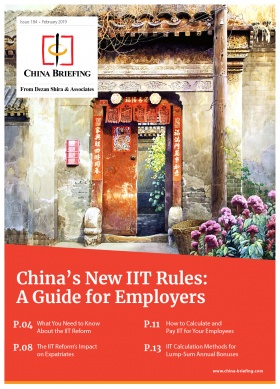Traveling in China – Business Etiquette and Culture

China is a fascinating country whose distinguished history of 5,000 years almost pales in comparison to the meteoric growth of the past two decades. It is a proud country full of rich traditions and multiple ethnic groups that is grappling with the reality of urbanization, capitalism, and globalization.
For those looking to do business with or in China, even a basic understanding of this history and culture can pave the way for better communications and successful agreements.
Those who have traveled the breadth of China know that any attempt to define China in simple terms is foolish. Every region of China has its own sub-culture and, in many cases, even its own language or dialect. Doing any sort of business in China requires flexibility, cultural intelligence, and quite a bit of humility.
If you’re willing to explore the craziness of China’s business culture, you’ll not only be rewarded with the potential to tap into a massive market, you’ll also come to appreciate how China has been able to establish itself as a global economic powerhouse over the past few decades.
Business basics – understanding the concept of “face” in China
Any discussion of business in China starts with a foundational topic: the concept of “face”. Face is the under-current that drives the flow of business and without an understanding of Chinese face, you may find yourself returning home scratching your head without a signed agreement.
There’s a saying in the Chinese language that goes 人要脸树要皮, which translates to mean “Men can’t live without face, trees can’t live without bark”.
In business, your Chinese counterpart needs “face”. If you’re not willing to give it to them, they might not be willing to do business with you. For many western business people, this seems like a silly game, but it is not something that Chinese take lightly.
How might this play out while you’re trying to do business in China?
One example would be how you interact with the boss of your company or the one with whom you are seeking to do business. While in many Western countries, being frank and “telling it like it is” is considered a good trait, in China, direct disagreement or raising of questions in public can cause a person to “lose face”.
The insult is so deep that business deals have been lost over this simple misunderstanding. You can read more about the nuance of Chinese face, but the important takeaway is to treat your hosts and potential business partners with the utmost respect and if you do have suggestions or challenges, bring them up carefully in private only.
Business communication in China (Email vs WeChat)
Business in China is usually conducted in Mandarin Chinese, the standard language in all parts of the country except Hong Kong and Macau. Within these territories, Cantonese is the lingua franca. Depending on the industry, you might find people who speak English, but this will be the exception and not the norm.
Although some international businesses in China communicate using email, you’ll find that throughout most of China, email is not the preferred method for communication.
Instead, you’ll be best served by downloading WeChat on your mobile device prior to arriving in China. Almost all communication, including both personal and business, is done using this app. In fact, WeChat is used by a vast majority of China’s 1.4 billion people to pay for things, buy train tickets, and do many other daily tasks beyond instant messaging.
Instead of giving out your email address, you will be scanning a QR code in the WeChat app and connecting with your Chinese counterparts on the messaging platform. The important thing to remember here is that in China’s business economy, relationship is currency.
In Chinese it’s called 关系 or “guanxi”.
When connecting with a Chinese counterpart, you are taking the first steps in developing a relationship that will serve as the foundation for future business deals. In other words, don’t just use WeChat to schedule appointments and negotiate agreements. Make chit-chat and be personal on the platform.
Understanding Chinese names
When it comes to names in China, you might find that people introduce themselves by an English name they were probably given when going through elementary school. They often do this to show respect, knowing that for foreigners, Chinese names can be hard to remember.
Be bold and ask for their Chinese name. Write it down if you have to. Calling a Chinese person by their given name is a small but important way to give them “face”.
Take note that in China, the family name, or surname, is listed first, followed by the given name. Using the example of President Xi Jinping, the name “Xi” is his family name while “Jinping” is his given name. It would be respectful to refer to him as “President Xi” while it would be insultingly informal to call him “Jinping”.
When you ask a Chinese person for their name, they will very carefully pronounce their family name while often giving little importance to – or even omitting entirely – their given name. If they give their name as “Wang Wenyin”, for example, you can refer to him as Mr. Wang to show respect.
Greetings and meetings in China
When you first greet a Chinese person in a business context, a traditional handshake is sufficient for both men and women. There is no need for the additional touching, kissing, or bowing that is present in some other Asian cultures. A simple “Nihao” or “hello” is an appropriate way to start any conversation.
It is common for business meetings to start a bit late or to begin with the serving of hot tea. Meetings in China are often slow to start and require a good amount of relationship building before diving into the main topic of conversation. This is important, especially for foreign business people who value being quick, straightforward, and on time with their meetings. This may be considered rude.
It all goes back to the concept of relationships or “guanxi” in China. It is often – although not always – a good idea to take time at the beginning of the meeting to build that relationship and find ways to give face where appropriate.
Business attire in China
For men, the normal business attire looks similar to most western countries. A button-down shirt with slacks and nice shoes is expected, while a jacket and tie would be considered formal. During the summer months, when the heat in China can be brutal in many regions, it is common wear either short sleeved button-down shirts or a polo. This dress code applies not only in the office but also during any informal gathering, such as meals and banquets.
The dress code for women is usually a simple blouse and skirt, although pant suits are becoming more and more common. Jewelry is perfectly acceptable and makeup is expected to be worn.
Depending on where you are in China, you shouldn’t expect air conditioning or heating to be present in office buildings. It’s more common in bigger cities like Beijing and Shanghai, as well as Hong Kong. For those who are prone to sweat, it is advised that you take along a handkerchief, a small towel, or even an emergency change of clothes.
Giving and receiving business gifts in China
The giving of gifts plays a small part in the culture of building relationships for business in China. In the past, this used to be a major part of doing business in the country, but over the past decade, China has cracked down on rampant corruption stemming from gift-giving.
Because of this, you’ll want to be careful not to be overly extravagant with your gifts. While giving a large gift might bring honor to your business counterpart in China, it also comes with the expectation to return a gift in kind. If government limitations preclude them from returning such a gift, they may lose face.
It’s best to keep gifts small and personal, if possible. For example, bringing a bottle of wine from a vineyard near your hometown or a special local delicacy would be both simple and personal. For a female counterpart, giving a nice skincare product from home can be a welcome gesture, or you could even consider giving the skincare product to a male businessman who is married. It may seem silly, but the ability to gift his wife a foreign skincare product could be a huge face-giving gesture.
For more business gift ideas, read through this China business gift guide.
China and the business banquet
The tradition of the Chinese business banquet is a long and storied one, but like the tradition of gift-giving, it has seen extensive change because of the government crackdown on graft. In many cases, lavish banquets have been replaced by moderate meals in order to limit over-spending that could raise eyebrows.
If you do find yourself at a Chinese banquet, you can expect to be seated at a large, round table with a Lazy Susan in the middle. The head of the table is wherever the highest-ranking attendee sits and positioning around the table goes in order of importance. If you’re not sure where you should be, wait to be seated.
Food is served as plates of cold dishes first, followed by the hot food. As the food passes by on the Lazy Susan, use your chopsticks or a spoon to grab it and put on your personal plate. An experienced business person in China will take their time and eat slowly, knowing that a Chinese banquet is a marathon and the food seems to never stop coming.
There’s one more aspect of a Chinese banquet that you may have heard about: the alcohol. You’ll likely be introduced to potent Chinese rice wine known as baijiu and are expected to give and participate in toasts throughout the evening. Abstaining from the consumption of alcohol is possible but will likely require a lot of willpower and a little bit of relationship capital – refusing a drink could cause the host to lose face. It’s ingrained in Chinese business culture to believe that you never really know a person until you’ve been drunk with them.
Deal negotiation often happens around the banquet table, but don’t expect a contract to be signed before the night is over. The purpose of a banquet is to solidify the business relationship and pulling out paperwork for signature shows a lack of good faith.
Staying safe while doing business in China
Generally speaking, China is a very safe country. Aside from petty theft and pickpockets, you won’t need to fear for your personal safety as you roam around China.
Visitors should take the same precautions in China that they would in any international country they visit. If you don’t feel comfortable going out at night, try to avoid it. Don’t keep too much cash on you and avoid seedy parts of town. Theft in a hotel room is rare, but thankfully most hotels offer a safe to keep your most important documents locked up while you’re away.
The best advice you can follow is to dress modestly and stay with a group. The Chinese are friendly people, but they likely won’t give you a second glance as you’re walking down the street.
Travel basics for China (Visas, money, phones)
As you prepare for your business trip to China, you’ll want to take a few very important steps to make sure that the journey goes as smoothly as possible.
China business visas
You will likely be applying for a Chinese M visa, a document reserved for those doing business and trade in China. You’ll need to apply for this visa two to three months prior to your trip and will be required to supply a China Business Invitation Letter. This letter will come from the trade fair, company, or client you are you coming to visit and must be on official header and stamped with the official seal (company chop). Most M visas allow for a 30 day stay in China and can be valid for up to 10 years.
Money in China
Because foreign credit cards are only accepted in a select few high-end hotels and shopping malls, you’ll need to make sure you have cash on hand. You’ll see most people in China using their phones to pay for daily items but since this requires a valid Chinese bank account to use, most short-term visitors must rely on cash. Thankfully, ATMs are plentiful around China and many accept foreign debit cards and credit cards issued by Visa or MasterCard. Make sure you notify your bank of your business trip so that they don’t freeze your account on suspicion of fraud.
Staying connected
While it’s possible to purchase a SIM card to use with your phone in China, it can be a tedious process. Often, it’s better to use the international roaming with your home plan or to purchase a pre-paid China SIM card to be delivered before your journey. Remember that China censors its internet, which means that unless you use a VPN, you won’t be able to access Google products (including Gmail), social media, and most western media, among other blocked websites.
For more travel tips to help you prepare for China, check out Travel to China | Everything You Need to Know Before You Go, a handbook which helps pre-trip planning and setting of expectations before you land in China.
About Josh Summers
Josh Summers is an author and entrepreneur who has been traveling and doing business in China since 2006. He has guest lectured at Peking University and Tsinghua University and writes for Lonely Planet, Fodors, BBC and many other publications. He and his family still consider the western Chinese region of Xinjiang to be their second home.
About Us
China Briefing is produced by Dezan Shira & Associates. The firm assists foreign investors throughout China and Asia and has done so since 1992. Please contact one of our China offices here, email us at china@dezshira.com, or visit us at www.dezshira.com.
- Previous Article Chinese FDI in the EU’s Top 4 Economies
- Next Article Sourcing Products from the US? Here’s What to Do about the New China Import Tariffs








